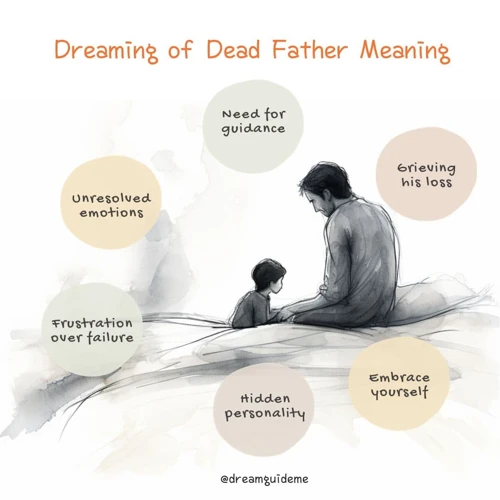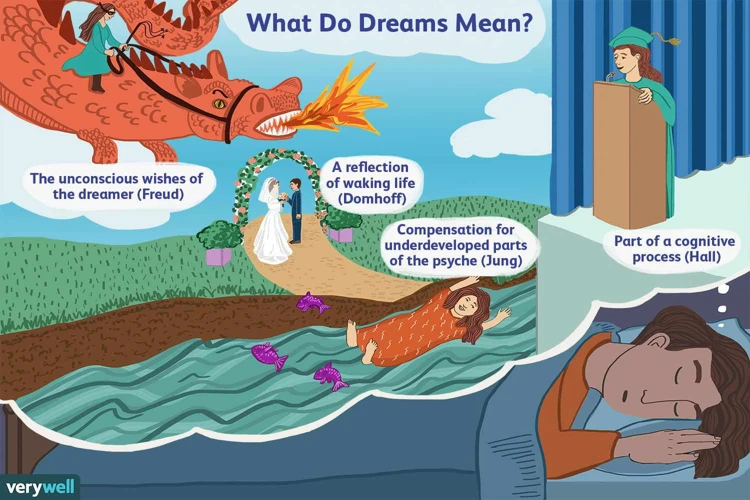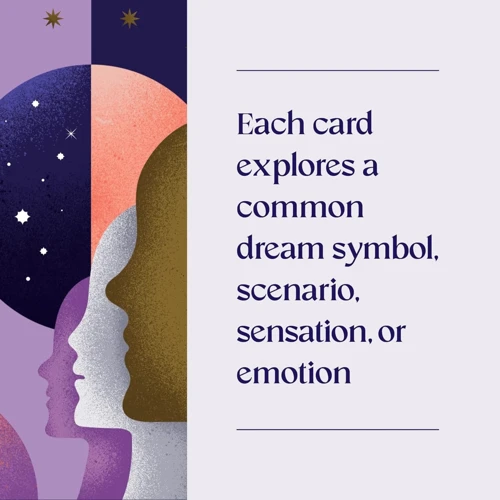Unraveling the Symbolism: The Meaning behind Dreams of Dead Parents
The Significance of Dreams

Dreams have long been a subject of fascination and intrigue, with countless theories and interpretations surrounding their meaning. When it comes to dreams of dead parents, these nocturnal experiences take on a profound significance that can offer valuable insights into our emotions, subconscious thoughts, and unresolved issues. Such dreams can serve as a medium for communication with our subconscious mind, allowing us to process complex emotions and gain a deeper understanding of ourselves. They can bring forth a range of emotions, from intense grief to feelings of closure and guidance. These dreams often contain symbolic elements that require careful interpretation to unravel their true meaning. By delving into the appearance of parents, the location and surroundings, as well as the actions and conversations that occur within the dream, we can begin to unlock the profound symbolism embedded within.
1. Emotions and Reflections
Dreams of dead parents often evoke a multitude of emotions and reflections within us. These dreams can elicit deep feelings of grief, sadness, and longing for the loved ones we have lost. They can serve as a way for us to process and come to terms with our emotions surrounding their passing. It is not uncommon for these dreams to bring up unresolved feelings or issues that we may have carried with us since their death. They provide a space for introspection and self-reflection, allowing us to explore our relationship with our deceased parents and understand the impact they had on our lives. By examining the emotions and reflections that arise within these dreams, we can gain valuable insights into our own psyche and the ways in which we continue to be influenced by our parents even after their passing.
2. Communication with the Subconscious
Dreams of dead parents serve as a powerful means of communication with the subconscious mind. Our subconscious holds a wealth of emotions, thoughts, and memories that may not be fully processed in our waking lives. Through these dreams, we have an opportunity to tap into those underlying aspects of ourselves and uncover hidden messages. It is believed that the subconscious mind uses symbolism and metaphor to convey its messages, often weaving them into the narrative of the dream. These dreams can provide clues about unresolved issues, unexpressed emotions, or even guidance for our waking lives. By paying attention to the symbols and messages in these dreams, we can gain valuable insights and facilitate personal growth and healing. So, the next time you dream of a deceased parent, take a moment to reflect on the potential significance of this communication from your subconscious mind.
Interpreting Dreams of Dead Parents

Interpreting dreams of dead parents requires a nuanced understanding of the emotions and symbolism at play. These dreams often reflect a deep sense of mourning and grief, allowing individuals to process the loss and find solace in their subconscious realm. They can also indicate unresolved issues and the need for closure, urging us to confront and resolve lingering emotions or unfinished business. Additionally, dreams of dead parents can serve as a source of guidance and support, offering valuable insights and advice from our subconscious mind. It is essential to pay attention to the symbolic elements present in these dreams, such as the appearance of parents, the location and surroundings, and the actions and conversations that take place. By analyzing these elements, we can unlock the hidden meanings behind our dreams and gain a deeper understanding of ourselves and our relationships with our deceased parents.
1. Mourning and Grief
Dreams of dead parents often evoke deep emotions of mourning and grief. These dreams can be a way for individuals to process their feelings of loss and sadness, providing a space for them to express their unresolved emotions. The presence of a deceased parent in a dream can bring up intense emotions, allowing individuals to work through their grief in a symbolic and subconscious manner. These dreams may provide solace and healing, allowing individuals to find closure and come to terms with the loss of their parents. It’s important to remember that dreams are highly personal and subjective, so the interpretation of these dreams may vary from person to person. If you’d like to learn more about the meaning behind dreams, you can explore the symbolism in the song “Don’t Dream It’s Over” by Crowded House, which delves into the complexities of dreams and their significance.
2. Unresolved Issues and Closure
Dreams of dead parents can often be triggered by unresolved issues and the need for closure. These dreams provide a platform for us to confront and address the lingering emotions and unresolved conflicts we may have experienced with our deceased parents. In these dreams, we may find ourselves engaging in conversations or actions that allow us to express our true feelings, seek forgiveness, or find resolution. It is a way for our subconscious mind to process and heal from any unfinished business that may still be lingering in our waking lives. By acknowledging and exploring these unresolved issues within our dreams, we can find a sense of closure and peace in our waking lives.
/crowded-house-dont-dream-its-over-meaning/
3. Guidance and Support
Dreams of dead parents can also provide a sense of guidance and support. In these dreams, our deceased parents may offer advice, share wisdom, or provide comfort during challenging times. This guidance can take various forms, such as a heart-to-heart conversation, a reassuring presence, or even symbolic actions that convey a message. It is important to pay attention to the specific details of the dream as they hold significant meaning. The guidance and support offered by our deceased parents in these dreams can serve as a source of strength and reassurance as we navigate through life’s complexities. For more information on the interpretation of dreams, you can explore the meaning of seeing ants in dreams or the significance of choking in dreams.
Understanding Symbolic Elements

Understanding the symbolic elements within dreams of dead parents is key to unraveling their deeper significance. These elements often contain hidden messages and representations that can provide valuable insights into our subconscious mind. Here are three important aspects to consider when deciphering the symbolism within these dreams:
1. Appearance of Parents: The way our deceased parents appear in the dream can hold significant meaning. Pay attention to their age, health, and demeanor. Are they vibrant and full of life, or do they appear frail and weak? These physical aspects can reflect the state of our own emotions and the unresolved issues we may have with them.
2. Location and Surroundings: The setting in which the dream takes place can offer further clues to its meaning. Are you in your childhood home, a familiar place, or somewhere entirely new? The environment can represent different aspects of your relationship with your parents or symbolize the challenges and emotions you are currently facing.
3. Actions and Conversations: Take note of the actions and conversations that occur within the dream. Are you engaged in a loving embrace, having a heartfelt conversation, or experiencing conflict? These interactions can reveal the nature of your relationship with your parents and shed light on any unresolved issues or emotions that need to be addressed.
By carefully considering these symbolic elements, we can gain a deeper understanding of the messages and insights our dreams of dead parents are trying to convey.
1. Appearance of Parents
The appearance of parents in dreams of dead parents can hold significant symbolism. It is important to pay attention to how our parents appear in these dreams, as it can provide clues to the underlying message. For example, if our parents appear healthy and vibrant, it may symbolize a sense of comfort and reassurance. On the other hand, if they appear sick or frail, it could indicate unresolved feelings of guilt or regret. The age at which our parents appear can also hold meaning, with younger versions potentially representing unresolved issues from our childhood. Additionally, the presence of any physical features or objects associated with our parents, such as their favorite clothing or a cherished item, can offer further insights into the messages being conveyed in the dream.
2. Location and Surroundings
When analyzing dreams of dead parents, the location and surroundings play a crucial role in understanding the symbolic meaning behind the dream. The setting in which the dream takes place can provide valuable insights into the emotions and experiences associated with the presence of deceased parents. For example, a dream set in the childhood home may represent a longing for nostalgia and a desire to reconnect with the past. On the other hand, dreaming of a hospital may symbolize a need for healing or closure related to the loss of a parent. The specific details of the surroundings, such as the weather, lighting, or even the presence of certain objects, can offer additional clues to the overall message of the dream. By examining the location and surroundings in dreams of dead parents, we can gain a deeper understanding of the emotions and themes that are being explored in the dream realm.
3. Actions and Conversations
In dreams of dead parents, the actions and conversations that take place hold significant meaning and can offer valuable insights into our emotions and subconscious thoughts. The actions performed by our deceased parents within the dream may symbolize specific messages or emotions that they are trying to convey. For example, a comforting embrace or a gentle touch may indicate a need for emotional support or reassurance. Conversations with dead parents in dreams can provide an opportunity for unresolved issues to be addressed or for guidance and advice to be imparted. These conversations may elicit strong emotions and can offer a sense of closure or resolution. It is essential to pay attention to the words spoken and the overall tone of the conversation to gain a deeper understanding of the message being conveyed by our deceased parents. By analyzing the actions and conversations that occur within the dream, we can unravel the symbolism and gain insight into our own emotions and subconscious desires.
Common Dream Scenarios

When it comes to dreams of dead parents, there are several common scenarios that individuals may experience. These scenarios can provide further insight into the meaning behind these dreams. Firstly, the dream of a joyful reunion with deceased parents is a recurring theme. In these dreams, individuals may feel a sense of comfort, happiness, and love as they encounter their parents, who seem alive and well. On the other hand, dreams involving conflict and distress are also common. These dreams may reflect unresolved issues, guilt, or unresolved emotions related to the loss of a parent. Lastly, dreams of receiving parental guidance and advice can signify a longing for support or a need for direction in one’s life. These dreams often bring forth feelings of reassurance and comfort, as if the parent is still looking out for their child even after death. Understanding these common dream scenarios can provide valuable insights into the underlying emotions and psychological dynamics at play within the dreamer’s subconscious mind.
1. Reunion and Joy
Dreams of reunion and joy with deceased parents can evoke powerful emotions and leave a lasting impact on our psyche. In these dreams, individuals often feel a sense of warmth, love, and happiness as they are reunited with their departed loved ones. The dreamer may experience a strong desire to embrace their parent or engage in joyful activities together. This dream scenario can serve as a source of comfort and reassurance, allowing individuals to feel a connection with their parents even after they have passed away. It can also symbolize a sense of closure, healing, and a resolution of any lingering grief or unfinished business.
2. Conflict and Distress
Dreams of dead parents can sometimes take a dark turn, where conflict and distress become the central themes. In these dreams, there may be intense arguments, unresolved issues, or a feeling of being overwhelmed with emotions. These distressing scenarios can be indicative of unresolved conflicts or unfinished business from the past that still linger in our minds. It is essential to pay attention to the specific details and conversations in these dreams, as they may hold valuable clues to the underlying issues that need addressing. Exploring the symbolism behind these dreams can provide us with an opportunity to confront and resolve these conflicts, ultimately leading us towards healing and personal growth.
3. Parental Guidance and Advice
Dreams of dead parents can often provide a sense of guidance and advice. In these dreams, the deceased parent may appear as a figures of wisdom and authority, offering valuable guidance or advice on various aspects of life. This can range from personal matters such as relationships, career choices, or important decisions, to spiritual and emotional growth. These dream encounters can provide a sense of comfort and reassurance, allowing individuals to feel connected to their deceased parents and gain a renewed sense of support. It is important to pay attention to the specific messages and advice given in these dreams, as they may hold valuable insights and directions for navigating through life’s challenges. By embracing and reflecting upon the guidance received in these dreams, individuals may find solace and a sense of direction in their waking lives.
Psychological Interpretations
Psychological interpretations play a crucial role in understanding the meaning behind dreams of dead parents. Sigmund Freud, the renowned psychoanalyst, believed that dreams are a manifestation of our unconscious desires and fears. According to Freud, dreams of dead parents can symbolize unresolved Oedipal conflicts or repressed emotions. On the other hand, Carl Jung’s analytical psychology offers a different perspective. Jung believed that dreams are a way for the subconscious to communicate and provide guidance. In the context of dreams of dead parents, Jung would interpret them as a representation of the archetypal mother or father figure, offering wisdom, guidance, or an invitation to integrate certain aspects of ourselves. These psychological interpretations provide valuable insights into the complex and multifaceted aspects of dreams of dead parents, helping us better understand their deeper meanings.
1. Sigmund Freud’s Perspective
Sigmund Freud, the renowned psychoanalyst, offered his perspective on dreams and their interpretation. According to Freud, dreams are a manifestation of our unconscious desires and repressed thoughts. In the case of dreams of dead parents, Freud believed that these dreams serve as a means for us to reconcile our feelings of loss and grief. He suggested that these dreams could be an expression of unresolved Oedipal or Electra complexes, where subconscious desires for the deceased parent are symbolically played out. Freud emphasized the importance of exploring the hidden symbolism within these dreams, recognizing that the images and actions presented may not be literal, but rather represent deeper meanings. By dissecting the various elements of the dream and connecting them to our own personal experiences, Freud argued that we can gain valuable insights into our psychological state and inner conflicts.
2. Carl Jung’s Analytical Psychology
Carl Jung, the celebrated Swiss psychiatrist and founder of analytical psychology, offers valuable insights into the interpretation of dreams, including those involving dead parents. According to Jung, dreams are not merely random manifestations of the subconscious, but instead, they contain symbols that reflect universal archetypes and collective unconsciousness. In the context of dreams of dead parents, Jung believed that they could represent the integration of our own parental influences and the journey towards individuation. These dreams may serve as a call to explore unresolved issues or unexpressed emotions related to our parents or the aspects of ourselves that they embody. Jung emphasized the importance of paying attention to the symbols, motifs, and recurring themes within dreams, as they can provide profound insights into our psychological development and inner conflicts. By engaging in a process of self-reflection and exploration, we can begin to unravel the rich and complex symbolism contained within our dreams of dead parents.
Conclusion
In conclusion, dreams of dead parents hold a deep and personal significance for individuals who experience them. These dreams provide a unique opportunity for emotional processing, subconscious communication, and gaining closure. By exploring the symbolism within these dreams, we can gain valuable insights into our emotions, unresolved issues, and seek guidance from our deceased parents. Understanding the significance and interpretation of these dreams allows us to navigate our emotions and experiences more effectively, ultimately leading to personal growth and healing. Whether these dreams bring moments of reunion and joy or conflict and distress, they offer a profound connection to our past and can serve as sources of wisdom and guidance for our present and future.
Frequently Asked Questions
1. How are dreams significant in our lives?
Dreams hold great significance as they provide a window into our subconscious mind, allowing us to explore our deepest emotions, thoughts, and desires that may be hidden or suppressed in our waking lives.
2. Why do dreams of dead parents carry a special meaning?
Dreams of dead parents hold a special meaning as they often represent unresolved emotions, unfinished business, or a desire for guidance and support from our deceased loved ones.
3. Can dreams of dead parents help with the grieving process?
Yes, dreams of dead parents can be a part of the grieving process. They can provide a space to process emotions, find closure, and even receive messages that bring comfort and healing.
4. Are dreams of dead parents always negative or distressing?
No, dreams of dead parents can vary in nature. While they can be emotional and even distressing, they can also bring feelings of joy, reunion, and offer guidance or advice.
5. How can dreams of dead parents help us gain insight into ourselves?
These dreams reflect our subconscious thoughts, emotions, and unresolved issues. By analyzing the symbolism and messages within these dreams, we can gain a deeper understanding of ourselves and our relationships.
6. Are there any common symbols or elements to look for in dreams of dead parents?
Yes, common symbols to look for include the appearance of the parents, the location and surroundings within the dream, and the actions and conversations that take place. Each of these elements can provide clues to the dream’s meaning.
7. Can dreams of dead parents provide guidance or advice?
Yes, dreams of dead parents can often offer guidance or advice. They might provide solutions to problems, offer reassurance, or give us a sense of direction in our waking lives.
8. Can analyzing dreams of dead parents be helpful in personal growth?
Absolutely. Analyzing these dreams can lead to personal growth by helping us confront unresolved issues, process deep emotions, and gain insights that can lead to positive changes in our lives.
9. Do experts in the field of psychology have different interpretations of dreams of dead parents?
Yes, different experts may have varying interpretations based on their respective theories and approaches. Perspectives from renowned psychologists such as Sigmund Freud and Carl Jung offer interesting insights into dream analysis.
10. How should one approach interpreting dreams of dead parents?
Interpreting dreams of dead parents requires a personal and introspective approach. It is essential to consider one’s own emotions, experiences, and the context of the dream to unravel its unique symbolism and meaning.







